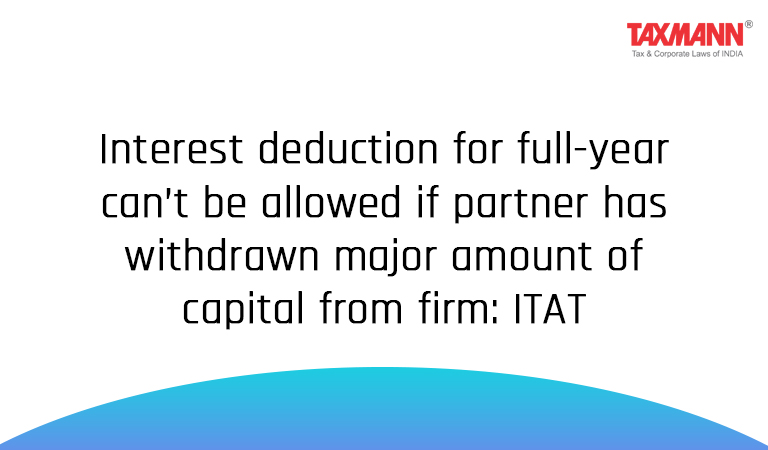Interest deduction for full-year can’t be allowed if partner has withdrawn major amount of capital from firm: ITAT
- Blog|News|Income Tax|
- 3 Min Read
- By Taxmann
- |
- Last Updated on 27 August, 2021

Case Details: Universal Stone Crushing Co. Dala v. ITO - [2021] 129 taxmann.com 199 (Allahabad - Trib.)
Judiciary and Counsel Details
-
- Vijay Pal, Rao, Judicial Member.
- O.P. Shukla, Adv. for the Appellant.
- A.K. Singh, Sr. DR for the Respondent.
Facts of the Case
Assessee was a partnership firm. It claimed a deduction for interest on the opening balance of the partner’s capital at the rate of 12% per annum. Assessing Officer (AO) noted that assessee had paid interest on the opening balance of Rs. 8.72 lakhs. During the year partner had withdrawn Rs. 8.55 lakhs. Consequently, the closing balance in the capital account was only a meagre amount. AO believed that the allowable interest on the opening balance for the full year was not admissible due to substantial withdrawal by the partner. Accordingly, he allowed interest on account of the partner’s capital on a pro-rata basis, i.e., by taking an average of the opening balance and closing balance at a lesser amount than what was claimed by assessee. CIT(A) upheld the order of AO.
ITAT held
On appeal, ITAT held that a plain reading of Section 40 shows that the provision begins with a non-obstante clause meaning thereby, amounts are not deductible even if the same is allowable under Sections 30 to 38. Therefore, the provisions of section 40 cannot be invoked directly for allowing the claim but the claim of deduction has to be first tested in terms of sections 30 to 38. Once the claim is allowable under the provisions of sections 30 to 38, then certain amounts as specified under section 40 are allowed as deduction only on satisfaction of specified conditions provided under this section.
Before invoking Section 40, the claim must satisfy the conditions provided under sections 30 to 38. In assessee’s case, interest paid to the partner has to be first allowable under the provisions of Section 36(1)(iii) or Section 37(1). Both these provisions stipulate a mandatory condition that the expenditure has been laid out for the purpose of the business of assessee. The residual provision of section 37(1) rather prescribes a more stringent condition that an expenditure has been laid out wholly and exclusively for the purpose of business or profession. Thus, for allowing the claim of interest paid to the partner, it has to be first considered in terms of section 36(1)(iii) or section 37(1), and then the claim has to be restricted as per the provisions of section 40(b)(iv).
In assessee’s case, the partner had withdrawn a substantial amount except a meager sum. Thus, the entire balance was not available with the partnership firm for its business purpose. Hence, the claim of interest for a full year at the rate of 12% was otherwise not allowable in terms of section 36(1)(iii) or section 37(1), as the case may be. Once the basic condition as prescribed under section 36(1)(iii) or section 37(1) was not satisfied regarding the allowability of a particular claim of interest, then the said claim couldn’t be allowed by invoking section 40(b)(iv), which was a restrictive provision and not enabling provision.
Case Review
-
- Pr. CIT v. Rimjhim Ispat Ltd. [2017] 81 taxmann.com 86/[2016] 382 ITR 152 (All.) (Para 12) followed.
- CIT v. Baburam Ajit Prasad [1977] 106 ITR 818 (All.) (para 12) distinguished.
List of Cases Referred to
-
- CIT v. Baburam Ajit Prasad [1977] 106 ITR 818 (All.) (para 10)
- Pr. CIT v. Rimjhim Ispat Ltd. [2017] 81 taxmann.com 86/[2016] 382 ITR 152 (All.) (para 10).
Disclaimer: The content/information published on the website is only for general information of the user and shall not be construed as legal advice. While the Taxmann has exercised reasonable efforts to ensure the veracity of information/content published, Taxmann shall be under no liability in any manner whatsoever for incorrect information, if any.

Taxmann Publications has a dedicated in-house Research & Editorial Team. This team consists of a team of Chartered Accountants, Company Secretaries, and Lawyers. This team works under the guidance and supervision of editor-in-chief Mr Rakesh Bhargava.
The Research and Editorial Team is responsible for developing reliable and accurate content for the readers. The team follows the six-sigma approach to achieve the benchmark of zero error in its publications and research platforms. The team ensures that the following publication guidelines are thoroughly followed while developing the content:
- The statutory material is obtained only from the authorized and reliable sources
- All the latest developments in the judicial and legislative fields are covered
- Prepare the analytical write-ups on current, controversial, and important issues to help the readers to understand the concept and its implications
- Every content published by Taxmann is complete, accurate and lucid
- All evidence-based statements are supported with proper reference to Section, Circular No., Notification No. or citations
- The golden rules of grammar, style and consistency are thoroughly followed
- Font and size that’s easy to read and remain consistent across all imprint and digital publications are applied



 CA | CS | CMA
CA | CS | CMA
